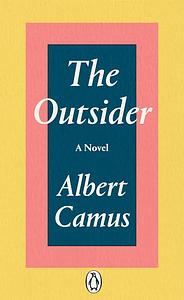Take a photo of a barcode or cover
challenging
dark
reflective
sad
tense
medium-paced
Plot or Character Driven:
Character
Strong character development:
No
Loveable characters:
No
Diverse cast of characters:
No
Flaws of characters a main focus:
Yes
reflective
medium-paced
Plot or Character Driven:
Character
Strong character development:
Complicated
Loveable characters:
No
Diverse cast of characters:
No
Flaws of characters a main focus:
Yes
challenging
mysterious
reflective
tense
medium-paced
Mersault, walau mungkin ia tak menyadarinya, memang telah terlepas dan berada di luar lingkaran masyarakat. Ia melihat dunia adalah dirinya: tubuhnya yang bergerak secara mandiri, waktu yang berjalan terus-menerus tanpa henti—juga tanpa perasaan, dan selalu berulang, yang mana, segalanya tak ada yang lebih penting selain menunggu ajal—dan ia harus benar-benar senang saat menghadapinya.
Dunia memang jenuh, dan bagi Mersault, ini membingungkan. Perasaan, sulit untuk dibedakan, bahkan, rasa mencintai dengan dicintai, baginya, hampir tak bermakna.
Membaca novel ini akan jadi penting jika anda ingin mengenal konsep absurdisme Albert Camus.
Dunia memang jenuh, dan bagi Mersault, ini membingungkan. Perasaan, sulit untuk dibedakan, bahkan, rasa mencintai dengan dicintai, baginya, hampir tak bermakna.
Membaca novel ini akan jadi penting jika anda ingin mengenal konsep absurdisme Albert Camus.
4.75
I can't stop thinking about this book. It really makes you think and it somewhat reminds me of Dead Man Walking, which is a great movie. This book explored how law and justice works which I have an immense interest in. It's a great book that I am grateful I picked up.
EDIT: I just realised that I looked at the book completely differently than what the author intended. This wasn't a novel about the justice system, rather the indifference that one man has towards life. Searching for the meaning of life while also being idle in pursuit of meaning. I think I need to re-read this novel so I can get the most out of it but I like the approach to this sense of life's absence in meaning through a philosophical lens.
I can't stop thinking about this book. It really makes you think and it somewhat reminds me of Dead Man Walking, which is a great movie. This book explored how law and justice works which I have an immense interest in. It's a great book that I am grateful I picked up.
EDIT: I just realised that I looked at the book completely differently than what the author intended. This wasn't a novel about the justice system, rather the indifference that one man has towards life. Searching for the meaning of life while also being idle in pursuit of meaning. I think I need to re-read this novel so I can get the most out of it but I like the approach to this sense of life's absence in meaning through a philosophical lens.
dark
mysterious
reflective
medium-paced
Plot or Character Driven:
Character
Strong character development:
No
Loveable characters:
No
Diverse cast of characters:
No
Flaws of characters a main focus:
Yes
he really doesn’t care
Second book in my Camus re-read. Like Sisyphus before it, my opinon has not changed. Still find this contrived and unsatifying.
Yes, I have read all the arguments, but it is just very hard not to see Mersault as just a boring, run-of-the-mill sociopath. Never does he really express any empathy or morals. The trial continues to feel a contrivance to get Mersault to a place where he can "philosophize" his way to articulate an absurdist position. And last, perhaps in 1942 this was much more radical, but the confrontation with the priest just lacks stakes.
Honestly, hoping my "yes, I was right the first go-around" holds for The Plague which is up next (in a new translation!) in my Camus re-read, because honestly it is hard to believe that the same person wrote this insufferable book as wrote The Plague...
Yes, I have read all the arguments, but it is just very hard not to see Mersault as just a boring, run-of-the-mill sociopath. Never does he really express any empathy or morals. The trial continues to feel a contrivance to get Mersault to a place where he can "philosophize" his way to articulate an absurdist position. And last, perhaps in 1942 this was much more radical, but the confrontation with the priest just lacks stakes.
Honestly, hoping my "yes, I was right the first go-around" holds for The Plague which is up next (in a new translation!) in my Camus re-read, because honestly it is hard to believe that the same person wrote this insufferable book as wrote The Plague...
I feel very far removed from his perspective but the book does remind me of an argument I had with my 6th grade teacher. She was telling me that the climax of a short story we were reading was on the last page. I kept saying no, no, it’s when they go to the Chinese restaurant, it’s when they eat celery and take out the strings, and she said no, it’s at the very end, when she accepts herself. Hmm maybe this will be one of the things I always remember. Anyways, for this book, I finally understood what she was talking about— the most important part was after the last few pages, after his veneer cracks, after he yells at the chaplain. Even if it wasn’t a release of emotions that he’d been bottling up, Meursault finally fully experienced emotions all the same— he gets one day, or a few hours, of living before he died.
‘Opened myself up to the gentle indifference of the world.’
‘Opened myself up to the gentle indifference of the world.’
dark
reflective
tense
slow-paced
Plot or Character Driven:
A mix
Strong character development:
Complicated
Loveable characters:
No
Diverse cast of characters:
No
Flaws of characters a main focus:
Yes
There's so much hype and praise around this book, but it's just....whatever....





